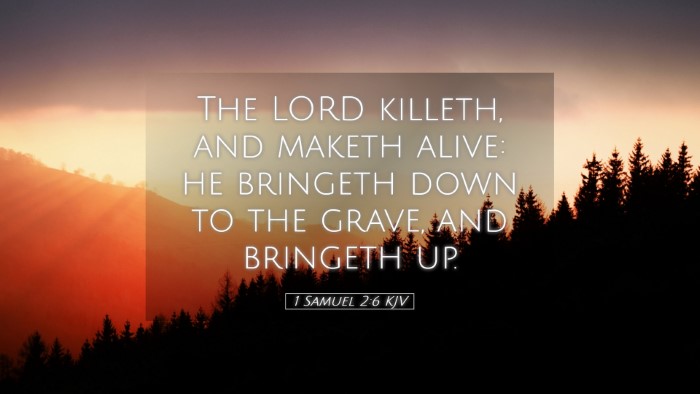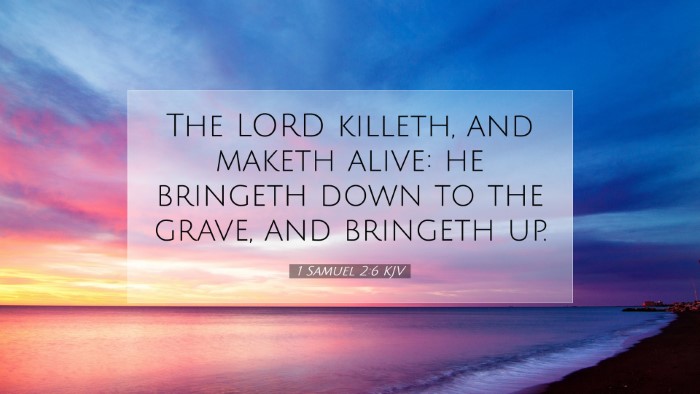Bible Commentary on 1 Samuel 2:6
Verse Analysis:
1 Samuel 2:6 reads: "The LORD killeth, and maketh alive: he bringeth down to the grave, and bringeth up." This verse stands as a powerful declaration of God's sovereignty over life and death, encapsulating a profound theological truth about the nature and character of God.
Divine Sovereignty
Matthew Henry's Insights:
Matthew Henry emphasizes the absolute authority of God in the affairs of life. He notes that the phrases "killeth" and "maketh alive" serve to remind the reader that God has the ultimate control over life and death. This assertion lays a foundation for understanding God’s providence, which is both wise and just. Henry articulates that God's actions are not arbitrary; rather, they align with His divine wisdom and purpose.
Albert Barnes' Commentary:
Barnes elaborates on the notion that God's power is not limited to spiritual matters but extends to physical existence. He suggests that the grave is not a final destination in God’s plan. The ability to "bring up" points to the hopeful resurrection and God's promises for life beyond the grave. Barnes underscores that God's engagement with His creation is both serious and compassionate, reflecting His desire for humanity's ultimate redemption.
Adam Clarke's View:
Clarke notes the duality of God's nature in this verse, presenting Him as the ultimate judge who grants life and takes it away. He points to the notion of deposing the proud and exalting the humble, which is a recurring theme in Scripture. Clarke stresses the importance of humility in the believer's life, as understanding God’s power leads to reverence and awe before the Almighty.
Theological Implications
Life and Death in God's Hands:
- This verse highlights the foundational belief in God's complete control over creation, which is integral to Judeo-Christian theology.
- The distinction between physical death and spiritual life is crucial for understanding salvation and eternal life through Christ.
- Believers are encouraged to uphold hope in God’s promises, particularly in times of suffering or loss, knowing He has the ultimate authority over life.
Practical Applications
For Pastors and Leaders:
- Encouragement to their congregations to trust in God's plan during crises of health or loss, reaffirming the hope of resurrection.
- Exhortation to emphasize God's grace, especially in teaching about mortality and the hope of eternal life that believers have in Christ.
For Students and Scholars:
- Analysis of the Hebrew words used in this verse can yield deeper insights into its meanings, particularly the connotations of life and death.
- Comparative study of this passage with other Scripture (e.g., Romans 8:38-39) that discusses divine sovereignty over creation.
Conclusion
The verse 1 Samuel 2:6 encapsulates a deep and profound truth about God's sovereign rule and the hope found in His promises regarding life and death. As Henry, Barnes, and Clarke elucidate, understanding this truth is vital for practical faith and theological reflection. May this verse inspire believers to live with an awareness of the divine power and presence that governs all aspects of life, fostering assurance and hope in the face of life’s uncertainties.


